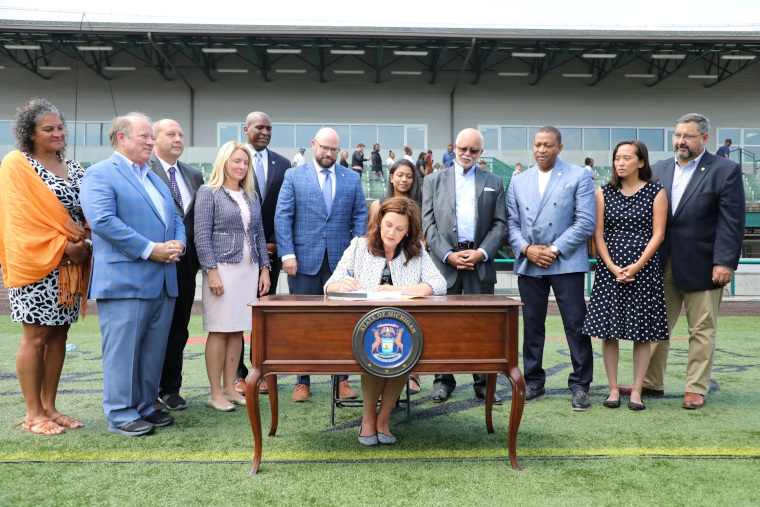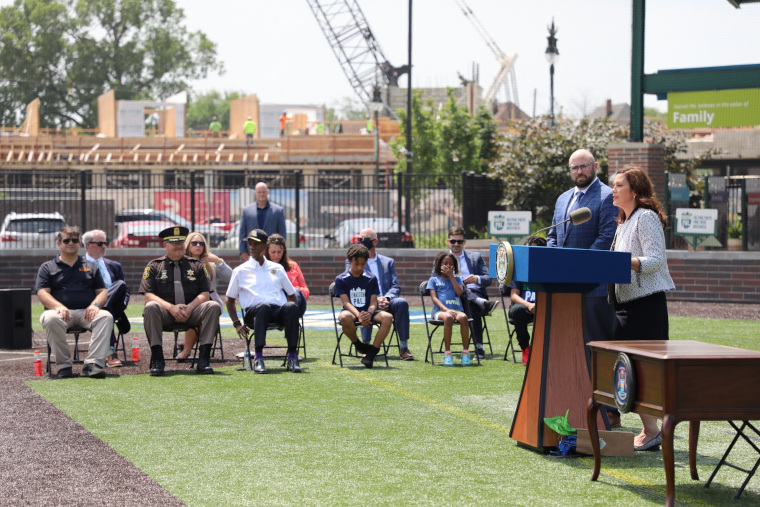DETROIT, Mich. — On July 20, Governor Gretchen Whitmer signed a balanced, bipartisan state budget for Fiscal Year 2023 that delivers on the kitchen-table issues and does not raise taxes by a dime. The governor signed the budget at The Corner Ballpark, a historic venue that was formerly the home of the Detroit Tigers and in recent years has been the home of the Detroit PAL program, a partnership between law enforcement and local communities on youth sports and enrichment. The budget funds the Detroit PAL program, helping it expand to more communities and serve more kids.
“Today, I am thrilled to sign my fourth balanced, bipartisan state budget that delivers on the kitchen-table issues that matter most to working families, was done on time, and does not raise taxes by a dime,” said Governor Whitmer on Wednesday.
“The budget will protect public health and public safety, expand mental health resources, grow Michigan’s economy and workforce, empower working families and communities, and pays down billions in debt,” the governor added. “I look forward to working with the legislature and furthering this spirit of collaboration to invest the billions of dollars in additional revenue we still have on the table to offer real relief to families right now, especially as they face rising prices on groceries, gas and other everyday expenses. I will work with anyone to put Michiganders first and get this done.”

The Budget
The Fiscal Year 2023 budget is balanced, does not raise taxes by a dime, pays down billions in debt, and brings Michigan’s rainy-day fund to an all-time high of $1.6 billion. It makes game-changing investments in every student and classroom, empowers working families and connects communities, grows Michigan’s economy and empowers its workforce, and protects public health and public safety.
The FY23 budget totals $76 billion, including a general fund total of $15.2 billion and a school aid budget totaling $17.5 billion. It provides a significant amount of one-time funding while maintaining balance in future years and does not utilize one-time funds for ongoing purposes.
The budget also makes a $180 million deposit to the Budget Stabilization Fund, which brings the rainy day fund balance to the nearly $1.6 billion all-time high.
Supporting Strong Families and Connected Communities
There are three key areas of the budget that invest in families and communities.
1) Honoring Those Who Serve
To ensure those who served have the support they need, the budget funds construction of a new veteran’s home in Marquette, backs a suicide prevention outreach campaign, and shores up the pensions of MSP troopers. To honor the memory of those we have lost, it establishes a veteran’s cemetery in Grayling.
2) Building Up Infrastructure
The budget expands on the investments in the bipartisan Building Michigan Together Plan signed in April by speeding up replacement of lead service lines, reducing traffic congestion at local rail crossings, improving state fish hatcheries, and funding long-overdue maintenance projects at state facilities.
3) Funding Critical Local Projects
The budget will make critical improvements to Selfridge Air Force Base in Macomb County, invest in Innovate Mound, a transformative project to rebuild Mound Road, one of the most important corridors in Southeast Michigan, and fund modernize Michigan’s armories, shoring up our readiness and supporting local construction jobs.
Growing Michigan’s Economy and Investing in Michigan’s Workforce

Budget investments in Michigan’s economy and workforce can be divided into three key sections: talent and workforce, regional economic development, and support for small businesses.
1) Talent and workforce
The budget’s talent and workforce investments will help build a skilled workforce that attracts transformative projects and economic development to Michigan and meet the governor’s Sixty by 30 goal to ensure 60% of Michiganders have a postsecondary degree or skills training certificate by 2030. It funds Michigan Reconnect, a program that has offered tens of thousands of Michiganders a tuition-free pathway to higher education and skills training. The budget also funds Going Pro, which helps small businesses develop in-house talent and fill high-skilled, good-paying job openings.
2) Regional economic development
To spur economic development in every region of Michigan, including rural communities, the budget kicks off a “Buy Michigan” campaign to support Michigan grown and raised products, funds the Pure Michigan campaign to promote tourism and boost local economies, and funds the Office of Rural Development, which was established by Governor Whitmer to focus on development in rural areas and provide support for food and agriculture businesses through economic development. These investments will uplift regional economies and create jobs in every corner of our state.
3) Small business growth
To create jobs and help small business owners fill openings, the budget will provide wraparound support for job seekers. The budget will help reduce barriers to employment, like lack of transportation, childcare, or tools, that keep people out of the workforce and slow economic growth.
Protecting Public Health and Public Safety
Public Health Investments
Budget investments in public health can be broken down into two aspects—behavioral health and community health.
1) Behavioral Health
The budget funds construction of a new state psychiatric hospital complex, replacing Hawthorn Center and Walter Reuther Hospital, to increase patient capacity and improve efficiency. To ensure Michiganders have access to mental health resources, the budget expands behavioral health capacity at existing facilities and offers student loan reimbursement for providers in Michigan.
2) Community Health
The budget funds construction of a new state public health and environmental laboratory to ensure that Michigan has the latest capabilities to protect communities. It betters health outcomes by improving access to dental care for Michiganders enrolled in Medicaid and boosting reimbursement rates for critical health services. Finally, for community health, the budget speeds up lead service line replacement, cleans up contaminated sites, and seals 182 abandoned oil and gas wells.
Public Safety Budget Investments
The public safety budget can be broken down into two categories—law enforcement training and resources and criminal justice. It will keep families safe by fighting crime and reducing violence.
1) Law Enforcement Training, Resources, and Community Programs
The budget makes several investments to improve relationships between communities and law enforcement, including funding for community policing programs and an expansion of the Detroit Police Athletic League (PAL) to more communities. It also graduates more state troopers to protect families and communities, establishes two new units for cybercrime and organized retail crime, supports training and equipment for narcotics teams, and provides funding to attract new recruits and police officers. Finally, the budget funds a pilot program to support victims’ needs early in their interactions with the criminal justice system while building partnerships with victim advocacy organizations.
2) Criminal Justice
The budget supports the development and implementation of a statewide judicial case management system to improve data management and efficiency and reduce court costs. It supports specialty programs addressing the root cause to stop the cycle of crime, funding a new Jobs Court program, an initiative to pair low-level, non-violent offenders with local businesses providing gainful and a long-term career path, and increase for problem solving courts targeting the mental health and drug use issues at the root of criminal activity. The budget also supports corrections officers and employees with investments that keep them safe on the job. Finally, the budget supports efforts to reduce the trial court case backlog resulting from the COVID-19 pandemic, ensuring continued access to justice for victims and the accused.


